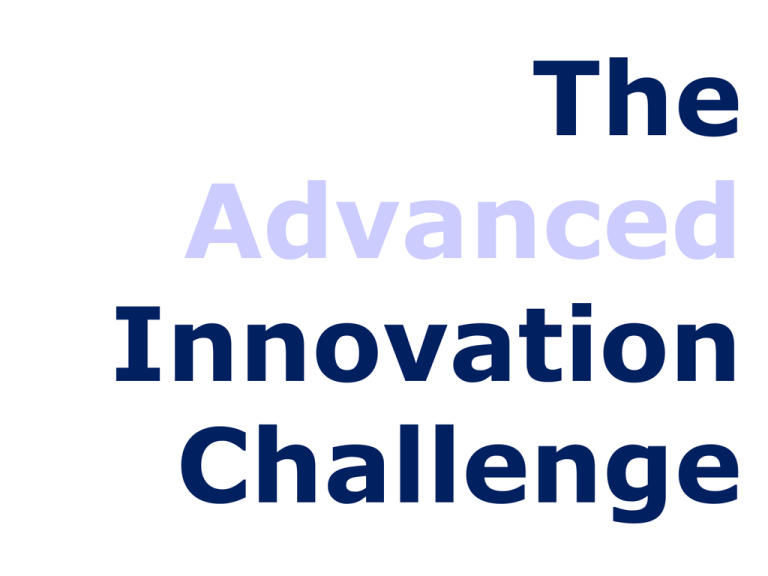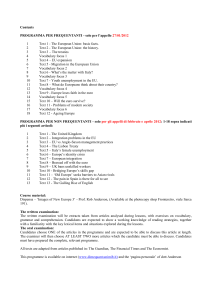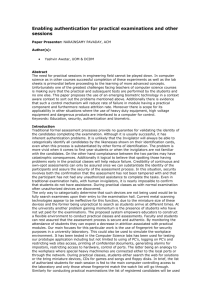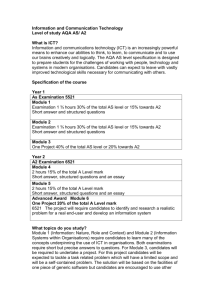Advanced Innovation Challenge Presentation
advertisement

The Advanced Innovation Challenge The Advanced Innovation Challenge requires the candidate to research a set theme and then respond to a range of challenges under timed examination conditions. New unit code F521 A theme is released in the September prior to the examination. Each theme runs for a year enabling candidates to research and gather resources forming a personal handling collection. Sporting events is an example theme. This paper is a seven-hour design challenge set by OCR. It is undertaken in two three-hour sessions over the period of one day and a one-hour session at a later date. All sessions are completed on dates set by OCR. The task assesses a candidate’s ability to be innovative, demonstrate flair, work with materials and apply knowledge gained throughout the AS course. Candidates select one challenge from the sheet related to the material area of their choice. There are several challenges dealing with all material areas covered by the specification. A workbook, linked to a teacher script, will be provided for candidates to present their work in. This will have sections that allow the challenge to be undertaken in a structured manner, helpful to the candidates. The activities and tasks that the candidates are required to complete over the six hours are ‘scripted’. Suggested timings for each section are given. A minimum of three photographs are required. These must be taken at set times, processed and attached to each candidate’s workbook. A digital camera and printer provide the best solution. Candidates model their most creative and exciting idea using a range of easyto-handle materials. Depending upon the activity they can choose from paper, card, thin plastics, fabric, wire, foil, thin metal sheet, clay, polymorph, foam board, food ingredients, components and joining devices During the Advanced Innovation Design Challenge Students sit in groups of two, three or four – you may need to select the groups; you know your students. At the end of the first threehour session collect in the workbooks and keep secure (as you would an examination paper) until the start of session 2 At the end of session 2 collect in the workbooks and keep secure (as you would an examination paper) until session 3 You Should •Supervise Health and Safety •Ensure that Materials/Tools are available •Read Instructions from Teacher Script •Ensure appropriate conduct within examination – you will need an invigilator with you Remember •This is an examination not a teaching opportunity •DO NOT advise students about their work •Be professional 1.1 Initial thoughts, design brief and specification Mark Clearly outlines initial thoughts in detail, 7–9 responding with an open mind, showing unexpected and/or challenging ways of thinking. Analyses problem in depth, responds in a way that allows scope for innovation. Identifies a user/market resulting in a clear design brief. Develops a detailed specification that identifies the key features of the product. A design brief and specification is produced on the A3 foldout page. This is always visible throughout the challenge. 1.2 Designing Presents a wide range of innovative/creative initial ideas, using high-quality annotated sketching showing full details of construction/materials. Presents a wide range of evidence to show the sources of inspiration and influences on the designing. Presents a detailed and objective evaluation of ideas against the design specification and justifies all decisions. Reflects on their chosen design and responds to feedback from others, making further improvements if necessary. Mark 9–12 Ideas are developed and modelled and the challenge includes a presentation of initial ideas to a working group with opportunities to react to feedback. Candidates will need to provide evidence of their job bag/handling collection and demonstrate how it has inspired their work. This could be done using photographs. Feedback from other candidates is recorded and this helps to develop the design 1.3 Development and planning Mark Presents improvements, presents 7–9 evidence of modelling, experiments, testing, making modifications to their design to define and refine it, thorough consideration of materials, components or ingredients and methods of manufacture. Produces a detailed action plan for Making, to include a list of materials/ingredients/resources etc 2.1 Evaluation Mark Presents realistic and detailed 6–8 modifications to their idea, using annotated sketches, improvements are creative. Produces a detailed evaluation of their product, identifying strengths and weaknesses and shows good consideration of the users/market. Evaluates their design thoroughly against their product specification Session 3 is a one-hour examination paper. Candidates have the opportunity to reflect on the challenge by answering questions that require them to consider their product. These will be derived from a design, manufacturing or marketing perspective including: • • • • • • • • • • • • sustainability and the environment product life social, moral and cultural issues environmental issues inclusive design the human interface aesthetics scale of production production technologies fashion marketing commercial issues Examples of candidates’ responses will be added to this website as they become available Reflect on the product you have designed. Prepare a marketing strategy to sell your idea to a manufacturer who is considering its viability. You should include: Information about your intended market and how you would target it. Modifications that could be made to your design to make it more economically viable. Scale of production. The following examples are provided by AS candidates after trial challenges. Inclusive design is an increasingly important issue that faces designers today. Reflect on the product you have designed. Prepare a discussion that reflects your product and which addresses inclusion such as design of environments and products, consideration of different user groups and associated accessibility. You should include: Any modifications you would make to your product to make it more inclusive to a broader range of users. Materials and manufacturing techniques that could be used. Cost implications. Mark Scheme Two outline presentation plans aimed at an expert panel will be produced. Answers will be in the form of written material supported by annotated sketches (10 Marks each). QWC is assessed in this paper P Q S relevant points/issues raised quality of explanation of these issues supporting example and sketches QWC quality of written communication OCR are running a very successful Innovation Challenge at GCSE Based on research and enthusiastically supported by Richard Kimbell and Goldsmiths University





